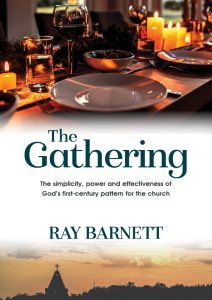Why is church such a frustrating, ineffective experience for so many sincere believers?
Why does the church seem to repel the very people that Jesus attracted? Why is it, that for all the dollars spent on buildings, clergy salaries, and denominational hierarchies, the institutional church seems to remain so ineffective and powerless to change our communities, let alone genuinely impact our own lives?
The simple answer is that, for too many centuries, our institutional structures have been based on a lie. We have been sold the notion that the leadership hierarchies, the clergy system, and the auditorium-based cycles of Sunday meetings are what God instructs us to do in Scripture.
Nothing could be further from the truth.
Challenging each of these fallacies, THE GATHERING sets out the Biblical foundation of what God actually does say about being a local church. For believers who are walking away from the suffocations of the past, or who would like to, THE GATHERING lays out a pathway towards a truer, more Biblical model of the local church.
ISBN: 979-8-7727195-3-4
Wine and Wineskins
A few days ago, I spoke with an old friend on the phone. I had not spoken with her for about ten years and, in an impulsive moment, I decided to track down her phone number and to call and see how she was doing.
We talked about all sorts of things. As a single mother, deserted by her husband, she had grown through the grief of divorce and had begun to develop a life of stability and purpose. She was studying at university as a mature-aged student and had almost completed a degree. She had decided to go back to work to support her three children and had risen to significant responsibility. She had grown. I found I was not speaking to a depressed, bewildered, abandoned young mum, but to a woman of purpose and focus.
Having covered all that ground, I asked her if she was still involved with a church. Silence! Then came the words: “Ray, I tried. I really tried. But finally it just got the better of me and I couldn’t keep trying.”
READ MOREShe said she still read the scriptures, she still prayed. But as for walking through the doors of a church to sit as a silent observer of a pageant run by a select few, it was just not part of her Christian walk or faith. In the workplace, relationships came naturally from the common purpose in which she and her colleagues were involved. They ate lunch together, worked together, talked together. In fact, they shared the major portion of their daily lives together. They went for drinks after work together. They knew each other and something of what was happening behind the scenes of each other’s lives. But such a sense of common purpose did not come naturally from her church, because the weight of the structure was levelled against true fellowship. The Sunday sermons did not allow for anyone to talk interactively and personally about life. In that forum she would never be asked to contribute to the collective wisdom, because she did not have a theology degree and was, after all, only a woman.
At work, she and her colleagues discussed and solved real-life challenges together at a very high level, things that made a difference today. At church, she and her brothers and sisters were an audience. Oh, she could become a Sunday school teacher, or youth worker she supposed, but was that the answer? She could join a home group, but if she did that and did not come on Sunday mornings, what would people say about her Christian commitment? The projected guilt for not attending the Sunday pageant would be more than she could bear.
She had grown so much as a person, but the one great and oppressive irrelevance to her life was the organised church. Her non-attendance was an act of honesty.
What was remarkable about the conversation was that there was nothing remarkable about it at all. I could have — and have had — that sort of conversation with many, many people. As one friend said to me: “If I were to place an ad in the paper asking for all the Christians in my district who had given up on church to come and meet at my home, I would probably end up with the largest church in the district, even if only half of them came.” he himself is a businessman with a degree in theology, a love for the people of God and a deep desire to serve Christ. He is recognised as a “lay preacher” and has served overseas on the mission field — but church? he has all but given up. It is just too hard, too fruitless and too frustrating to try to be part of a large and (to him) irrelevant institution.
I was at a business conference a while ago with some extremely intelligent, socially powerful men and women. They were entrepreneurs, private bankers, top-level consultants and financiers. It was not a Christian meeting, but a secular conference about leadership philosophy. I was deeply impressed by how many of them spoke of their faith in Christ and how much their understanding of Jesus had contributed to their business philosophy and world-view. Without embarrassment or hesitation, they challenged secular world-views on the value of people, contrasting them with the value Jesus places on people. Most impressive!
But what made a deeper impression upon me was that, during the breaks when speaking with all of those I perceived to be active, committed followers of Jesus, I discovered almost none of them had anything to do with a local denominational church. Church, as it is usually organised and institutionalised, was an irrelevance to them. It went nowhere near touching their lives or allowing them to change their society. They found their fellowship in other places and had simply got on with the business of following Jesus.
I have spoken with young adults, older people, former missionaries and church elders, all of whom love the Lord but who, when pressed, admit that their local church is not relevant to their lives. That is the point. In some cases, the Sunday meeting might be entertaining or have well-presented preaching, but it does not make any significant contribution to how they live in the world. Nor is it a definable contributor to their spiritual growth. Conventionally they are compelled to regard as the core of their Christian experience a meeting that makes little difference to their lives and rarely attempts to deal with the issues they are dealing with.
They are urged under pressure of guilt to “get involved” in the various program options that are put to them. They continue to attend for reasons of commitment, guilt, habit or fear of offending God. It is not that they do not love the people in their local church, but that the regular grind of unfruitful, culturally inappropriate meetings is wearing them down. It is not that they do not want to serve, but they do not want to serve on the outer edge of an institution, fitted into programmes designed by others, doing tasks created without reference to the desires and gifts they have.
A serious warning from Jesus
“And no-one pours new wine into old wineskins. If he does, the wine will burst the skins, and both the wine and the wineskins will be ruined. No, he pours new wine into new wineskins” (Mark 2: 22).
Jesus warned us against any attempt to put new wine into old wineskins. It was a serious warning. In the mind of Christ, both the wine and the wineskins are necessary and both must be in harmony. To care greatly about bringing believers back to the true wine of the Gospel while neglecting to conform the structures and cycles of religious life to that Gospel is a recipe for disaster. The old wineskins will burst. The wine will continue to be spilled.
As evangelical Christians, we owe a great deal to the Reformation, that wonderful day of emancipation from the tyranny of superstition and of reawakening to the grace of God. But the Reformation, which trod so heavily upon the heresies, laws and superstitions of the time, only lightly touched the nature and structure of the local church. Our forefathers stepped back from the ecclesiastical excesses of what was sixteenth-century Rome, but only so far. They left us still wandering in its shadows. Consequently, in even the most grace-oriented churches, the Gospel is still in conflict with the structures in which it is preached.
Untouchable tables, cups and plates; tasks reserved for priests or the specially licensed; religious cycles that command and govern our weeks; guilt and fear associated with our failure to attend mandatory gatherings in dedicated buildings; rituals that can only be presided over by special men — all these are about old wineskins. In so many places we have done everything we can to remove true conversation and participation from the fixed and binding meetings of the church, while at the same time proclaiming the wonders of the fully-functioning body of Christ.
The people become an audience for the one person who is licensed and paid to speak and the few people musically talented enough to access the microphone. And when we attempt what Jesus asked us to do and “remember him” in what we call the Lord’s Supper, we feel forbidden to chat together about him for fear of breaking the sacred silence — the only permitted sound being mood music.
Is it a shadow of medieval Rome or of Old Testament Judaism? Perhaps both. But it is certainly not the Gospel of freedom and grace. It is not even remotely like what is taught and modelled in scripture.
To go back to the words of Jesus, there is the need to discern whether the new wine of the Gospel is truly being poured into new wineskins or whether pre-Reformation superstitions — or perhaps even “gospelised” Judaism — are still dominant shadows over the structures and cycles of our common life together.
The most casual observation reveals that the wineskins are bursting. Our cities and suburbs are awash with people for whom church has simply become so frustrating, unhelpful and irrelevant that the only honest option for them has been to walk away. Others, bound by guilt, doggedly stick to the cycle of meetings — unable to articulate what is wrong, but afraid to walk away.
Some of the spilled wine is being gathered into alternative wineskins. In some cases, they are huge auditoriums with engrossing musical experiences and preachers who offer everything the secular society offers: health, wealth, power and influence. The individual sits as one in a thousand — or five thousand — drawn into a collective musical experience called “worship” while remaining all but anonymous. The preacher/pastor doesn’t even know their name. The relationship between these new institutions and the church, as we see it in the New Testament, is as different as chalk and cheese.
The gap is incomprehensible, but so limited is our modern understanding of who or what a local church is that these new super-wineskins are accepted as readily by some as the old wineskins of “gospelised” Judaism are accepted by others. We are so blown around by every passing wind that we will attempt anything that seems to be able to collect and hold people in one place.
In my experience, evangelical Protestants — of which I am one — want to be Bible-based. But on the subject of how we are to be structured and organised as local churches, the most ardent of Bible-based church leaders will defer to manuals of church practice and church laws. Even when those man-made manuals plainly conflict with the open statements of scripture, it seems they cannot be changed.
God has spoken
God has spoken a great deal on the subject of the local church. We cannot act as if what he has said doesn’t matter. We cannot continue as if our traditions, church laws and practices are equal to or greater than what God says. Nor are we free to employ the very best of the world’s methodology while disregarding the clear statements and instructions of scripture.
It is rarely possible to find our way to a new destination unless we can accurately describe where we are now. So at some point we need to open our eyes to the true nature of our Western, post-Reformation ecclesiology. We have gathered people, built buildings, incurred phenomenal debts, made lenders and builders rich, paid salaries and provided career paths. We have built bureaucracies, written rulebooks and wandered our way through an ever-expanding forest of programmes. But we have produced disproportionately little by way of the dynamic, world-changing discipleship so plainly spoken of by Jesus.
Forsaking all and following him is not a message that sits well in multi-million-dollar worship centres. The nature of the structures we have created ensures that we cannot easily reproduce ourselves or freely apply ourselves to humanity’s deepest needs. While billions of dollars have flowed into our hands, the poor and oppressed — so passionately spoken about by Jesus and the prophets — have largely remained untouched, unless they want to come and sit in one of our buildings. We have more and more seminaries with higher and higher degrees, but people in the pews know less and less of the Bible.
At the very simplest level, imagine you were presented with a group of new believers. Imagine yours was the challenge of healing their wounds and setting them free from every entanglement of the “kingdom of this world”. Imagine that your goal was to turn them into active, dynamic disciples who, in a short period of time, would reproduce themselves and begin to turn their community upside down. Imagine that you wanted them to become truly recognisable as followers of Jesus in a fallen world, a living demonstration of the kingdom of God.
Would you ever, in your wildest imagination, decide that the best way was to urge them to give as much money as possible — so as to finance and build an auditorium — and then get as many hundreds of them as possible into that auditorium once a week to sit in silence while they listen to a graduate orator? Would you forbid them to have the Lord’s Supper until someone with a degree in theology or licensed by the denomination was present? Would a bleeding, beaten young believer who wandered into the meeting be forbidden the Lord’s Supper because he was not yet a “member” or not baptised your way?
Would anyone ever construct such a system as being the best, Gospel-centred means for growth in dynamic, world-changing discipleship?
More importantly, did God construct such a system?
COLLAPSE





